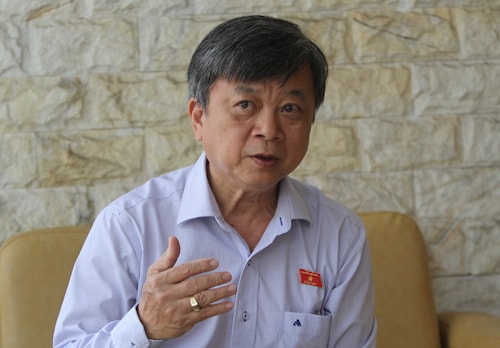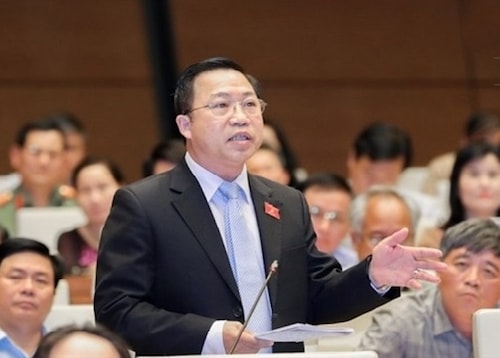Will taxing 45% of unexplained assets 'open the way for money laundering'?
Mr. Truong Trong Nghia said that there are many types of assets being hidden whose owners are willing to "pay a 45% tax and keep the rest".
The Government Inspectorate has just proposed new regulations in the draft Law on Anti-Corruption (amended) on handling assets and income that are declared dishonestly or increased without reasonable explanation.
Accordingly,After verification, if the competent authority concludes that the actual assets and income of the cadre, civil servant or public employee are greater than the declared assets and income or the explanation of the increased assets and income is unreasonable, the tax authority will consider collecting personal income tax at a rate of 45%.
Commenting on the above content, National Assembly delegate Truong Trong Nghia said that first of all, societyWe should not be prejudiced or hastily suspect wealthy officials and civil servants. Because civil servants in the transition to a market economy have many opportunities to have assets many times higher than their salaries, but still legally.
"Don't think they are rich and send their children to study abroad and think they are corrupt. Many people become rich thanks to successful investments in real estate, stocks, or business partnerships, because they are smart and knowledgeable...", Mr. Nghia said.
|
Ho Chi Minh City National Assembly delegate Truong Trong Nghia worries that the 45% tax rate will pave the way for money laundering. Photo:VVT |
"Paving the way for money laundering violations"?
With the proposal to impose a 45% tax, Mr. Nghia expressed disagreement, "assets of public officialsIf the origin cannot be explained, it cannot be taxed as usual, because personal income tax is only levied on legal income." According to him, there is currently tax collection for tax evaders because it is legal income but is falsely declared to evade or reduce tax; it is different from assets of unclear origin. Therefore, tax collection on assets that civil servants dishonestly declare is like other types ofother legal assets are not reasonable.
"Acting as the inspectors' proposal could pave the way for money laundering violations. When officials and civil servants are unusually rich and deliberately do not declare, or give unreasonable explanations, and only have 45% collected and 55% retained, this is what makes them willing to violate."
The delegate analyzed that gangs smuggling drugs, contraband goods, embezzlement or theft of public funds will be willing to borrow the hands of officials and civil servants to launder money legally with the formula "pay a 45% tax and keep the rest".Meanwhile,Vietnam's civil service is made up of several million people, most of whom have low incomes, many of whom cannot live and support their families on their salaries alone.
"Money laundering today is not only domestic but also cross-border," Mr. Nghia warned and assumed,Of the 1,000 unexplained assets, 300 are actually illegal, but there is not enough evidence to prosecute, then 55% of them will become legal.
According to him, the drafting agency said it would continue the investigation after collecting taxes, but the civil servant himself, when asked, did not give a reasonable explanation about his assets and income, deliberately dealing with the organization, the investigation later will be very difficult because they will erase all related evidence.
"Personally, I cannot explain the legality, rationality, and ethics of this regulation," Mr. Nghia emphasized.
"Illegal assets should be confiscated instead of taxed"
Faced with the reality that over the past time, many people have worked as civil servants for decades, with normal salaries but have assets worth hundreds of billions, and then explain that they have it from growing vegetables, raising chickens or selling brooms, Mr. Nghia said that "The simplest way that many countries do is to legislate to confiscate the property, that property belongs to society".
"It is not normal for officials and civil servants to explain unreasonably the origin of their assets. They are hiding something, at least violating public discipline. Even if it is not proven that the assets were obtained through crime, if the owner of the assets cannot prove the legal origin, then confiscation is a fair way to treat them," Mr. Nghia said, emphasizing that this only applies to officials and civil servants.
Agreeing with Mr. Nghia, delegate Luu Binh Nhuong - Standing member of the Committee on Social Affairs, said thatThe 45% tax rate proposed by the drafting committee is baseless because if it is a tax rate, it must have a common basis and be implemented according to tax law; if it is a special tax rate, it must clearly state the basis and which document regulates it.
|
Delegate Luu Binh Nhuong said that the 45% tax rate proposed by the inspection agency is not based on clear grounds. Photo:QH |
"The tax collection regulations issued by the Government Inspectorate are very difficult to implement because there will be major problems when implemented. It should be noted that in practice, there are assets that are not obtained through corruption, but officials and civil servants cannot or do not want to resolve them."Accountability violations cannot be equated with other violations such as corruption," Mr. Nhuong emphasized.
Director of the Institute for Legislative Studies Nguyen Dinh Quyen expressed his views., to handle assets and income declared dishonestly, of unknown origin, it must be through a court judgment to ensure legality. The United Nations Convention against Corruption has provisions on the conductIllegal enrichment, Vietnam should study internalization for application.
According to Mr. Quyen, in the immediate future, the authorities shouldIntroduce into the Penal Code a number of crimes related to illegal enrichment, applicable to cases where the origin of assets cannot be proven for handling. In the long run, the root of the problem isStrictly manage the income of people in positions of power by controlling payments for assets of large value, for example, assets over 100 million VND that are not paid through the bank are illegal assets.
"Thus, cases of billions of dong in assets being paid without going through banks that are discovered by authorities are considered illegal," he said.
The draft Law on Anti-Corruption was reviewed by the Judicial Committee in early March and is expected to be submitted to the National Assembly for comments at the mid-year session, opening on May 20.



